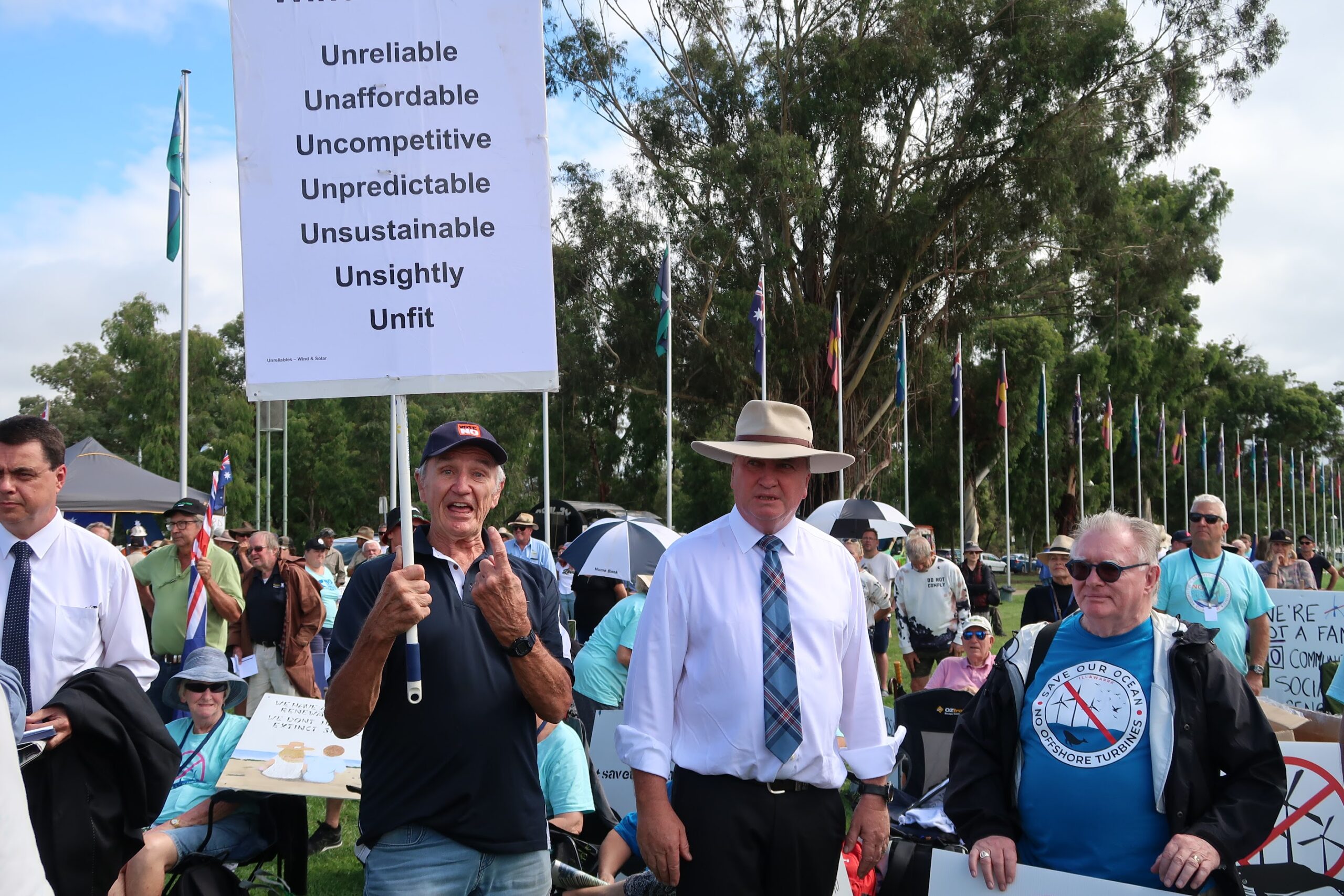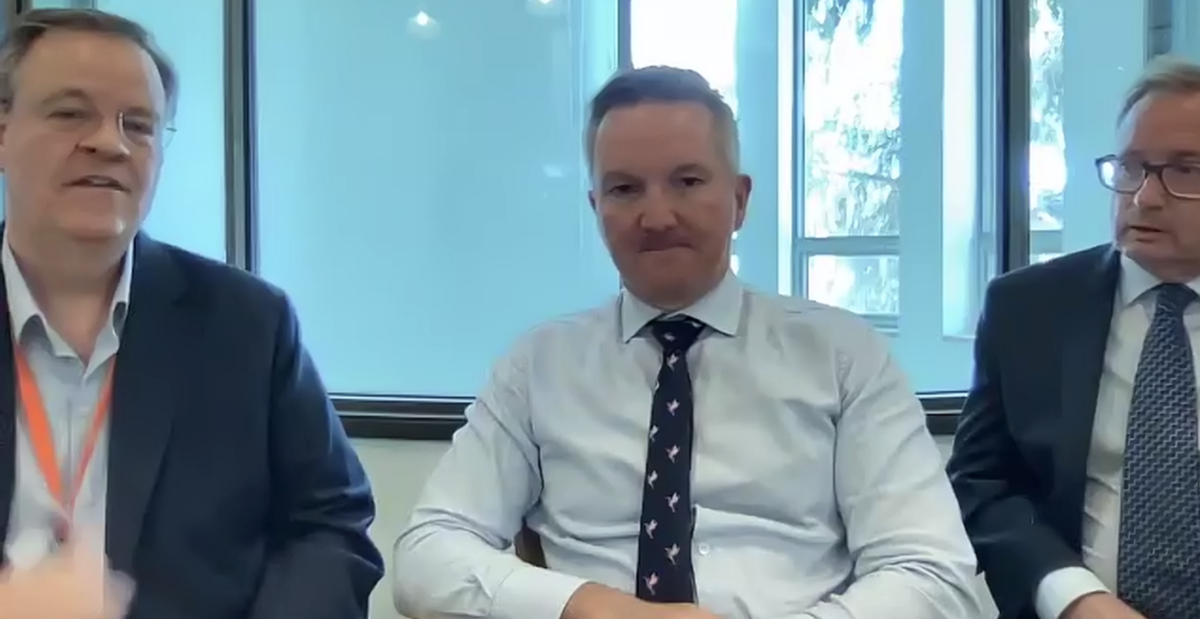While the political winds for renewable energy have changed since the election of the Albanese government in May 2022, renewables deployment and emissions reductions remain contentious issues and storm clouds are brewing.
Policies like the New Vehicle Emissions Standard and Capacity Investment Scheme are pointing to the supportive framework being put in place by the Labor federal government. However, Tuesday’s Rally Against Reckless Renewables, held in front of Parliament House, demonstrate that energy policy can be politicised by opponents.
Australian federal parliament returned to Canberra after its summer recess this week. The Smart Energy Council hosted minister Chris Bowen on a webinar on Thursday, during which he warned that the opposition Liberal and National parties are looking to attack the government over its energy policy agenda.
“There are some genuinely held concerns in the regional community [about] how can we better improve community benefit and community engagement,” said Bowen. “There are people of good faith with those concerns and those whipping up community concern for political benefit.”
The Climate Change and Energy Minister said the “Dyer review” of community engagement for renewable energy development addresses some of those concerns. The review was completed by Andrew Dyer, Australian Energy Infrastructure Commissioner (AEIC), and was released on Feb. 2. The government has accepted, in principle, its nine recommendations.
The pressure the government is coming under regarding its energy policy was evident during Thursday Question Time in parliament. Three questions were directed to the government about its proposed New Vehicle Emissions Standards, which the opposition has labelled a “car and ute tax.” In its coverage, the ABC helpfully added parenthesis, “it’s not a tax”.
The policy is currently open for community consultation and Bowen said that public support will be required to weather attacks. “It is a fight and so we do need people that believe in this stuff telling this story. Until it passes the Senate it’s not done.”

Photo: Harrison Johnstone/Smart Energy Council
Support for solar
A key piece of the federal government’s energy policy is the expanded Capacity Investment Scheme (CIS). The CIS involves reverse auctions to set floor project revenues – essentially a Contract for Difference (CfD) scheme to underwrite projects. CIS tenders have been held in South Australia, Victoria, and New South Wales, however large-scale solar projects have yet to benefit from the program.
During the Smart Energy Council webinar, Bowen confirmed that the first national CIS auction is scheduled for April. He noted that he is working with the state governments to ensure that the project delivers renewable energy and energy storage capacity additional to state programs, rather than replace them.
“We’re working on how we can make sure states aren’t going to take their foot off the gas,” Bowen said. “For example, we are not going to underpin 32 GW and then have them [the projects| stuck in state planning systems for 6 years.”
The state and federal energy ministers will meet in March where the issue will be discussed. “The states said ‘we’ll work with you,’” added Bowen. The meeting is the Energy and Climate Change Ministerial Council (ECMC) and will be held in Adelaide.
“Consumer energy”
Another item for discussion by the energy ministers next month will be the “National Consumer Energy Resources Roadmap.” The term “consumer energy” is being used, Bowen said, in preference the industry term “distributed energy.”
One issue that is expected to be on the table during the consumer energy roadmap discussion is the expansion of the Small-scale Renewable Energy Scheme (SRES) to incorporate distributed batteries. The Clean Energy Council has been pushing for such a move.
Such an expansion of the rooftop solar subsidy would undoubtedly accelerate the uptake of batteries by homes and small business. It would also help overcome network integration issues posed by high penetration levels of rooftop solar, and go some way in addressing solar’s price cannibalisation challenge.
The SRES has been extremely successful in Australia’s robust residential rooftop solar market segment. It has also proven extremely resilient to political attack and popular with voters. An expansion of the SRES to residential batteries could well be a welcome policy measure in a contested landscape.
John Grimes, the CEO of the Smart Energy Council made the case for such a measure in the webinar on Thursday. “Rooftop solar is now carrying a massive load. If we can couple the generation of rooftop solar with affordable, professional energy storage to time shift that generation it does two things: slashes power bills [for households installing batteries] and pushes down electricity prices for everybody.”
In terms of the political stakes, Bowen was unequivocal: “[Opposition leader, Peter] Dutton would be a worse PM for the climate than Scott Morrison or Tony Abbott.”
This content is protected by copyright and may not be reused. If you want to cooperate with us and would like to reuse some of our content, please contact: editors@pv-magazine.com.









OPINION & RESPONSE: In the history of Australia’s energy policy, Chris Bowen emerges as the worst Minister, orchestrating a reckless rollout of so-called renewables that does almost nothing to combat climate change. Trees, oceans, corals, the very biodiversity his “rollout” is devastating, all do that. But this is not about climate, transition nor electricity. Bowen’s allegiance seems tethered to funding unions and industry-dominated “buy your seat” organisations featuring greenwashed labels like the ‘@Smart Energy Council or the Clean Energy Council, blatantly disregarding the national and public interest for “investment opportunities” underwritten by taxpayer dollars? Let’s not start on superannuation. Bowen dismisses an authentic growing grassroots coast & country movement as being “politically whipped up” but it is not. It is being fanned by Chris Bowen MP and his Australian Labor Party’s utter contempt and disregard for regional Australia, as laid bare in Australian Energy Infrastructure Commissioner, Andrew Dyer’s, damning report with its tokenistic recommendations. Bowen is wreaking havoc on our communities, bushlands, oceans, & our economy: the reckless rollout rate is not in our national interest. The true cost of his Capacity Investment Scheme remains concealed, as he willfully runs our grid into the ground. When blackouts inevitably strike, he’ll conveniently point fingers at coal and gas, while being the architect of our grid’s demise with taxpayers burdened for generations paying foreign multinationals for unreliable electricity. Bowen’s failure to keep pace with our Allies and even explore nuclear options only compounds his folly (submarines are exempt?). The stakes are not merely high; they’re crystal clear. Labor’s failure is imminent, and the Australian public will cast their resounding vote of no confidence. We will stop Bowen’s unfolding dark chapter of incompetence, environmental degradation, economic, and energy mismanagement.